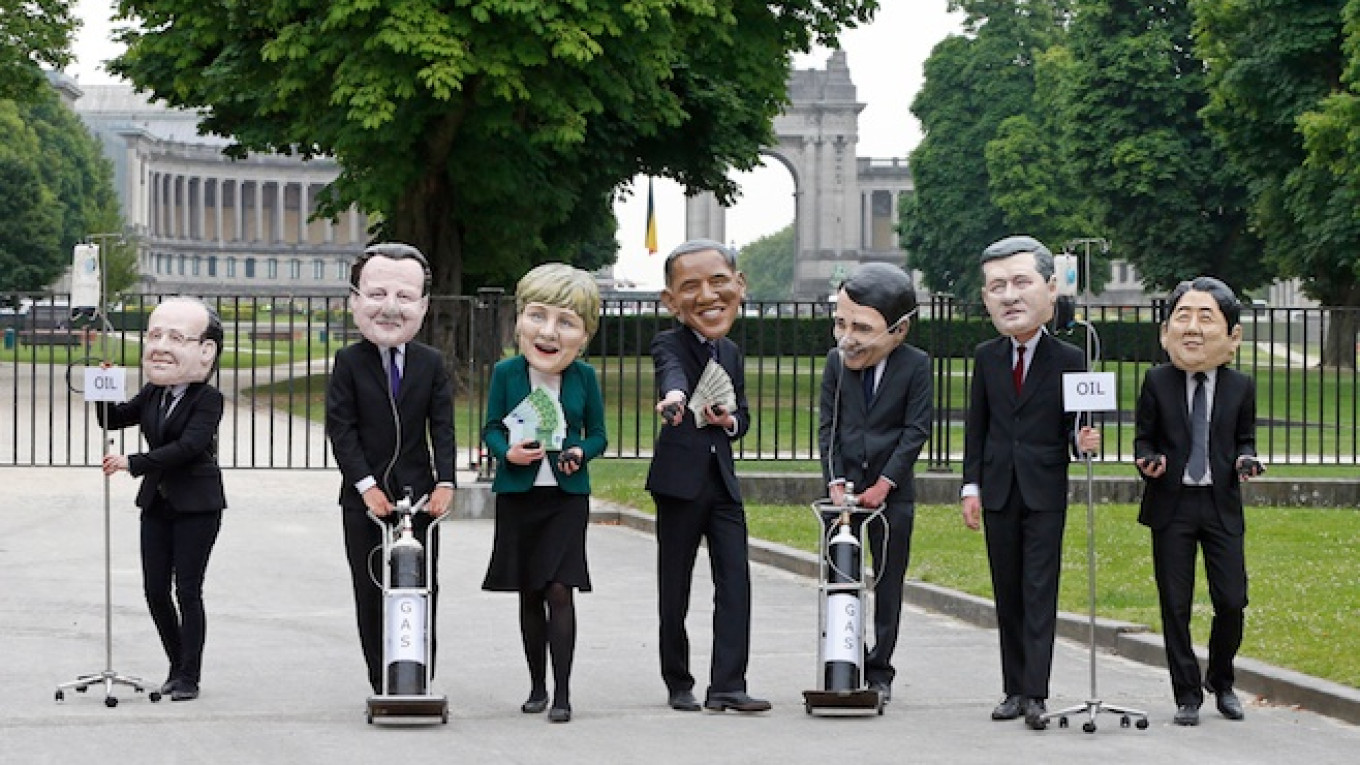The world's leading industrialized nations meet without Russia for the first time in 17 years on Wednesday, leaving President Vladimir Putin out of the talks in retaliation for his seizure of Crimea and Russia's part in destabilizing eastern Ukraine.
The two-day Group of Seven summit, taking place in Brussels rather than the previously planned Russian Black Sea resort of Sochi, will cover foreign policy, economics, trade and energy security.
The latter is an issue of particularly high sensitivity to Europe after months of tension with Moscow, which supplies nearly a third of Europe's oil and gas.
While it is the first time Russia will not be at the table since joining the club in 1997, Putin will still hold one-on-one talks with German Chancellor Angela Merkel, Britain's David Cameron and French President Francois Hollande this week, on the sidelines of the 70th anniversary of the D-Day landings.
The decision to drop Russia from the group was taken by its other members — the U.S. Germany, France, Britain, Canada, Japan and Italy — in March, after Moscow seized Crimea and annexed it, a move not recognized internationally.
Since then, the EU and the U.S. have imposed travel bans and asset freezes on senior Russian and Crimean officials and threatened to apply much harder-hitting economic and trade measures if Moscow is deemed for have further destabilized eastern Ukraine.
While Russia retains substantial forces on Ukraine's eastern border, and pro-Russia militias are operating in many towns, presidential elections took place relatively peacefully across the whole of Ukraine last month, which the West took as a signal of Moscow's readiness not to escalate the crisis.
That sense of increased cooperation has raised questions about whether the European Union, with its critical trade and energy ties with Russia, could soon seek ways of drawing Moscow back into the fold, such as allowing it to rejoin the G8.
Officials responsible for coordinating this week's summit did not rule that out Tuesday, but said Moscow had a long way to go to prove its intentions were sound and that it was capable of acting like a "normal democratic country."
Russia denies that it is behind the revolt in eastern Ukraine. It also asserts the right to protect Russian-speakers in the region.
Economics and Trade
The Wednesday-Thursday summit will begin with a dinner to discuss foreign policy, including Russia and EU assistance to Ukraine, as well as Syria, Afghanistan, Mali, the Central African Republic and North Korea, officials said.
Economic discussions on Thursday morning are expected to be dominated by trade, including ongoing EU-U.S., EU-Canada and EU-Japan free-trade negotiations, cooperation on tax avoidance and efforts to sustain the global economic recovery.
After economics, leaders will discuss energy and climate policy, including efforts to diversify supplies — code in Europe for shifting away from dependence on Russian oil and gas — and reduce carbon emissions via greater energy efficiency.
The summit's last session, over lunch on Thursday, will cover development assistance, including disease control and vaccination programs in Africa and food security.
See also:
A Message from The Moscow Times:
Dear readers,
We are facing unprecedented challenges. Russia's Prosecutor General's Office has designated The Moscow Times as an "undesirable" organization, criminalizing our work and putting our staff at risk of prosecution. This follows our earlier unjust labeling as a "foreign agent."
These actions are direct attempts to silence independent journalism in Russia. The authorities claim our work "discredits the decisions of the Russian leadership." We see things differently: we strive to provide accurate, unbiased reporting on Russia.
We, the journalists of The Moscow Times, refuse to be silenced. But to continue our work, we need your help.
Your support, no matter how small, makes a world of difference. If you can, please support us monthly starting from just $2. It's quick to set up, and every contribution makes a significant impact.
By supporting The Moscow Times, you're defending open, independent journalism in the face of repression. Thank you for standing with us.
Remind me later.


